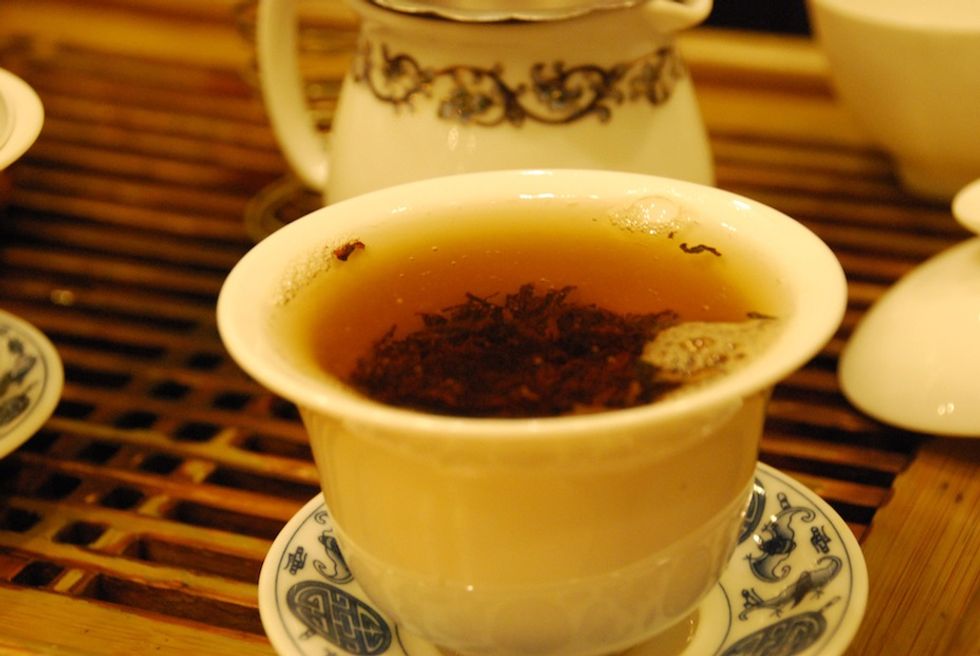Tea People Vs Coffee People... Because there is no such thing as middle ground. You are either decidedly one or the other, and if you hang on the fence to avoid the revolution, you will be cast into the pits of rabid dogs along with those heathens, the Hot Cocoa People.
-Chelsea Fagan
This is a personal story about my rapid, yet gently guided (thanks, Salar) dive into tea appreciation after years of being a very dedicated (and anxious) coffee drinker. The shift away from coffee culture has changed my life for the better. Really.
Following the story is a lovely and informative chat with a dear friend/divine human, Salar Rajabnik.
When I was a child, I sat in a vacant lot next to our home pulling dandelions from the earth collecting them in a tiny clay pot I made at school. I would sing and press the flowers between rocks, grinding and grinding until it made a sticky paste. Then I would pretend it was medicine for my dolls.
Fast forward ten years to my early twenties when I sat in the warm attic of a house nestled near a tiny apple orchard and a coop full of chickens. I poured over texts on medical herbalism and collected over a hundred tiny jars of herbs. That summer, I taught myself how to make decoctions, tinctures, tisanes, and infusions. I carried with me a glass jar of brewed herbs to sip all day every day. It was one of many rituals.
It wasn’t until I hit my mid-twenties and endured the incessant pressures to produce and provide that I became wholly obsessed with coffee. Coffee culture had become a sort of sanctuary for me, even a raison d’être at times. The marriage of late nights and early mornings had me worshipping my French press, a silent prayer for the tantalizing aroma and stimulating buzz.
Everything about my morning cup of black coffee, plus my afternoon espresso pick-me-up (and sometimes even a post-dinner cup) felt deeply satisfying for years.
Until one night, it hit me. One night, I laid restless in bed, feeling burnt out, my mind chattering, heart racing. I watched the moon hang obnoxiously bright outside my window for hours. Another night of coffee-induced panic and insomnia, and I had even kept my caffeine intake well within a healthy limit for weeks by that point. That was it for me, the jittery crash wasn’t worth it anymore. I was finally ready to break the habit for good.
I figured the only real attachment I had to coffee was the brewing ritual itself — the simplicity and comfort of the elements... the fire, the steam, the whistle of the kettle, the moments of fleeting presence that came with cradling a hot mug and lifting it to my lips… ritual can be so deeply nourishing. But there are so many other brewing rituals to explore and I had to set my French press aside, for sanity's sake.
It was around then that I began the shift from coffee to tea, and the first step: I had to quit coffee... and I of course had to quit cold turkey during finals week of fall semester, right? Some would call that masochism, I call it uncompromising self-love. Regardless, I made it through those long nights of studying and binge-writing senior research papers without a milligram of caffeine. Dark half-moons cradled my heavy eyelids, my head ached, my body ached, the withdrawals were no joke.
After about two weeks of drowsy laziness and dragging my feet everywhere I went, my energy levels soared again and my brain fog lifted considerably. One morning I woke up and finally felt balanced and renewed at last. I felt clear-headed and vibrant, something I'd rarely felt as a jittery coffee addict.
However, my personal shift away from coffee wasn’t made entirely alone. My friend Salar unknowingly converted me simply by sharing his love of tea with me. We’ve talked about his love of tea versus my love of coffee and how vastly different the two cultures can be, and even how they seemingly overlap in various ritualistic aspects. Salar has much to say about tea and tradition, and I'm forever grateful for the ability to pick his brain on the regular.
Salar Rajanik, Shang Tea.
Jasmine: I know I’ve said I love herbal “tea” in the past and you mentioned “tisane” being the correct term. What's that about?
Salar: I think that a lot of what is called “herbal tea” in the Western world, and consequently now globally due to exported capitalism, is labeled as such... but technically is not “tea” per se. Historically speaking, tea is a drink discovered in ancient China that’s prepared by steeping the loose leaves of the camellia sinensis plant in hot water. There are many varietals of that plant family, resulting in the different styles of tea. So actually, plant material that’s not camellia sinensis being brewed in hot water is not “tea” in the literal sense. It’s just brewed herbs. However, the term “tea” has come to generally refer to any kind of hot brewed plant beverage as a sort of blanket term, and many tea-centered cultures still brew non-tea herbal concoctions as well, including China.
Jasmine: Thanks for clearing that up. So, what is your personal favorite tea? Describe the taste?
Salar: My favorite tea is white tea, especially aged. The vast majority of tea available today is heavily processed, often poorly. White tea, if harvested & prepared properly, is unprocessed. It’s just pure tea leaves from a particular varietal steeped at the right temperature & for the right time. It’s a very delicate, nourishing, clean, refreshing flavor & mouth feel.
Jasmine: Let's discuss tradition and ceremony...thoughts? I'm curious about different practices or customs.
Salar: If you asked an English person, they’d say that Indian varietals of tea should be served with sugar & milk. An Iranian or Turk might say strongly steeped loose leaf of the black/red varietal should be served with sugar cubes on the side. A Japanese person may feel that a green tea or matcha, a powdered & concentrated green tea, should be served in a highly formal ritualistic setting. Rituals vary greatly based off of culturally distinct traditions that have developed over the years. Historically, there’s lots of info available about what traditional brewing processes were like in each country prior to globalism & lots of that distinct practice being lost.
I default to the traditional Chinese process since it was the first & is the oldest method which evolved from within the land & culture that discovered tea in the first place.
To over simplify, the most important elements are:
1. Clean, pure water
2. High quality, loose leaf tea (nearly impossible to find anywhere today, even in China)
3. The correct water temperature
4. A quality brewing vessel, preferably high quality porcelain
5. Some basic knowledge of steeping process/time/technique.
The ritualism is all individually & culturally subjective/significant & even with zero ritual practice just utilizing these basic 5 principles should yield good tea.
Jasmine: Thank you for sharing that. What is your favorite part about your own ritual? How does it make you feel?
For me personally, whether I’m drinking alone or brewing for friends, I am intentionally stopping what I’m doing & taking a moment amidst the incessant commotion of modern life to reflect, relax, & nourish myself or others. I cherish the simplicity & simple joy & health benefits I am lucky to enjoy from a natural plant material & water. Much of my “tea philosophy” comes from my being raised in a tea centric culture (Iranian) and from having the privilege & honor to be taught everything I know about Chinese tea from a Chinese farmer/tea sage. I use porcelain tea ware & especially love to brew out of a gaiwan, a Chinese lidded bowl, or my unglazed porcelain pot. Sometimes I don’t get the time to do this or do it to the extent that I’d like but this general frame of mind is what I try to stay within. There are many philosophical parallels between brewing tea & Taoism, which have significance for me.
I love that the process is unique & specific to each individual.
Jasmine: From previous conversations, I know you feel pretty strongly about quality.
Salar: I do. The main reason why isn’t because I want to be a tea snob, it’s sort of two-fold:
- Tea has the potential to provide incredible medicinal & health benefits if it’s raw nutritional elements have not been ruined by poor production or growing practices. So drinking tea devoid of those benefits is basically pointless.
- There’s not much of a linear curve or range of tea quality. The vast majority of what’s available, even stuff that’s priced much higher, is in many cases chemical laden corporate farmed low quality clippings swept off of a factory floor & bagged. Even the “top shelf” stuff from these facilities is usually scorched in the processing stage & by the time it’s offered to the consumer is devoid of any value from a flavor, health & quality perspective. All that you’re left with is a dent in your wallet & a cool looking graphic design on the bag.
So, because of these factors, it’s sort of A. Drink real, healthy & delicious tea or B. Drink tea that tastes bad & isn’t too good for you. There are only a handful of good tea sources in the West in the wake of the global coffee trend, and without question the most ethically & qualitatively pure is Shang Tea in Kansas City, Missouri. Zehua Shang, the owner, is a farmer who personally grows & picks & processes the tea himself with a small team in China. He uses no chemicals, utilizes ancient & pure processing methods, & is deeply passionate about what he does.
Zehua Shang, Shang Tea. Photograph courtesy of Shang.
Jasmine: Well, you've already made me a loyal lover of Shang Tea, so there's that. And thanks to your suggestion, I also now have a Kung Fu Teacup. I love how convenient the filter is. And speaking of...I know you feel passionately about this one, so share your thoughts on bagged tea versus loose leaf?
My personal bias aside, the fact is that bagged tea is a modern phenomenon which purely exists for convenience. As such, most bagged teas are the lowest quality material available. Like, lowest of what’s already very low. Brewing good loose leaf tea allows the leaves the space for all of the potential nutrients to properly absorb into the water. It also allows for more control over the steeping process & prevents over-steeping, and potentially allows for re-steeping the same set of leaves instead of tossing the bag away after one use. Of course, the tea must be quality enough to be able to be steeped more than once to begin with.
Jasmine: Right. Makes sense. So, what are the different types of tea and their flavor profiles?
Salar: The most common would be:
•White tea: Light, delicate, pure & very full of nutrients as it should traditionally never be processed & thus should retain it’s raw plant benefits more than other styles.
•Green tea: Quite trendy as of late & the victim of an avalanche of disinformation, bad science & health scams. Often very poor quality & mass produced to match the marketing demand. But in its pure form a “grassy” or more “vegetal” tasting tea with great health benefits which is traditionally processed less than black/red tea but more than white.
•Wulong/oolong/blue tea: A Chinese style of processing which involves a strong focus on oxidation & a rolling/roasting/twisting process. Very popular & a great option for a sort of “midway” point in that it’s not as dark as a black/red or as light as a white tea.
•Black/red tea: Usually the most heavily oxidized & processed style. The British-by-way-of India styles of Darjeeling & Asssam fall within this category. Processing this style without scorching the leaves completely is a very nuanced & rare process.
•Puerrh tea: A recently more popular but very old style of Chinese tea, usually from the western provinces. Overall puerrh involves a distinct processing style different from the ones used in other styles, and yields a very intense, thick, earthy & rich texture & flavor, described by even some coffee drinkers to be intense. Often processed into compressed tea cakes or bricks.
•Matcha: A Japanese style which is essentially green tea finely ground into an extremely concentrated powder.
•Herbal “Tea”: Steeped herbs in hot water resulting in any number of brewed concoctions, often used like elixirs for specific health benefits.
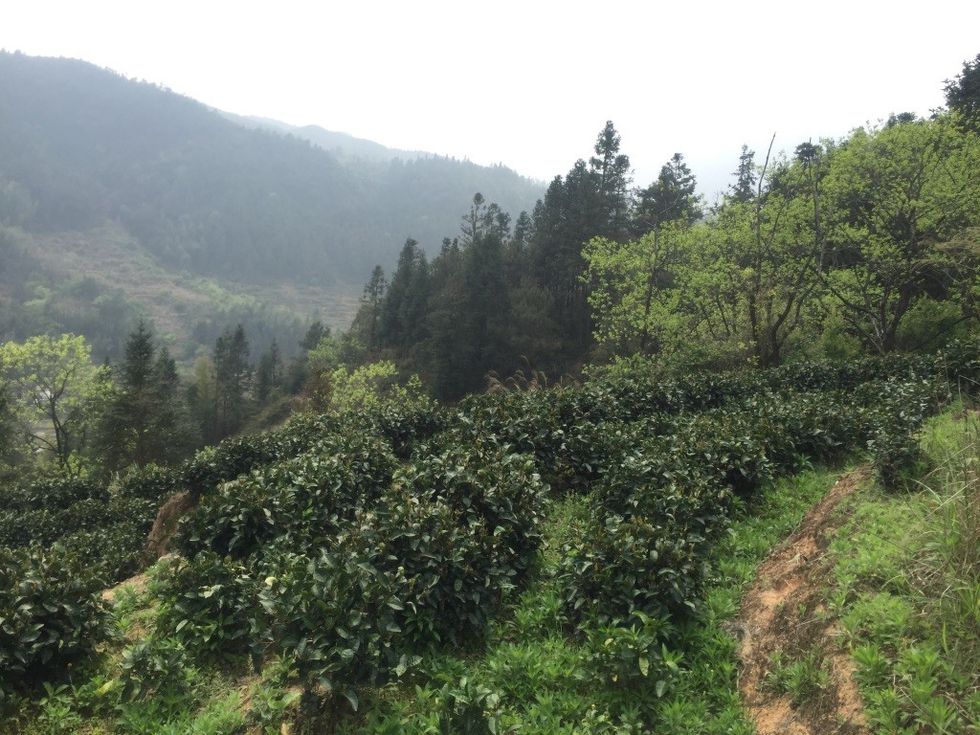
Photographs courtesy of Shang.
Jasmine: Anything else you’d like to share?
Salar: I think the thing I love most about tea is that it is, or should be, so simple & pure. It has a rich & valuable history but ultimately it is just the enjoyable consumption of brewed leaves. Yet it’s simplicity can yield such powerful benefits.
Shang, the Chinese farmer who taught me everything I know about tea, has a sort of tea mantra: “Drinking tea, talking principles.” I think this phrase & philosophy encompasses the very simple & pure joy & benefit of tea for me. Whether you’re talking those principles (philosophical, health, or otherwise) with friends or with yourself, the significance & simplicity remains.
Another sort of mantra is one shared with some friends: “Happy Brewing”. Tea should be about enjoying & appreciating pure & healthy elements in a thankful, reflective & joyous setting. Anyone interested in the “dao de cha” (the philosophy of tea, so to speak), should obtain the inexpensive, quality & simple elements necessary to brew & dive right in.
Thanks to Salar Rajabnik for sharing his love and knowledge, and thanks to Zehua Shang for the beautiful creation of Shang Tea and preserving and continuing the ancient ritual of tea drinking. I highly recommend visiting the Shang Tea website for more information, and to meet any and all of your future tea needs.
Whether you're a seasoned tea lover, a curious beginner, or in-betweener, I highly recommend ordering the Sampler from Shang. It's great for those of us indecisive loons who like continuous change and variety. Give it a brew.
As for me, since making the switch, my anxiety levels are essentially non-existent. I feel clear-headed, balanced, and deeply nourished. Stepping away from coffee consumption was more than just a mental health choice, it was a chance for me to reestablish a more loving relationship with my body. Coffee, for me, seemed to reduce my body to a machine on autopilot. The more I needed to accomplish in a day, the more coffee I consumed. It's clearly a powerful symbol (and tool) of capitalist values.
Tea has done quite the opposite of that for me. It's been grounding, introspective, reflexive, and nourishing. I don't drink it to fuel my fire of production like I did with coffee, I drink it to pull away from all that. It soothes and calms. It centers me and enables me to be a better nurturer to those around me. With that, I've absolutely become a far more productive human being.
If you're a regular coffee drinker and experience anxiety or panic, I highly suggest replacing what's in your morning cup. It's not easy in the beginning, but it can make a world of difference. It did for me.


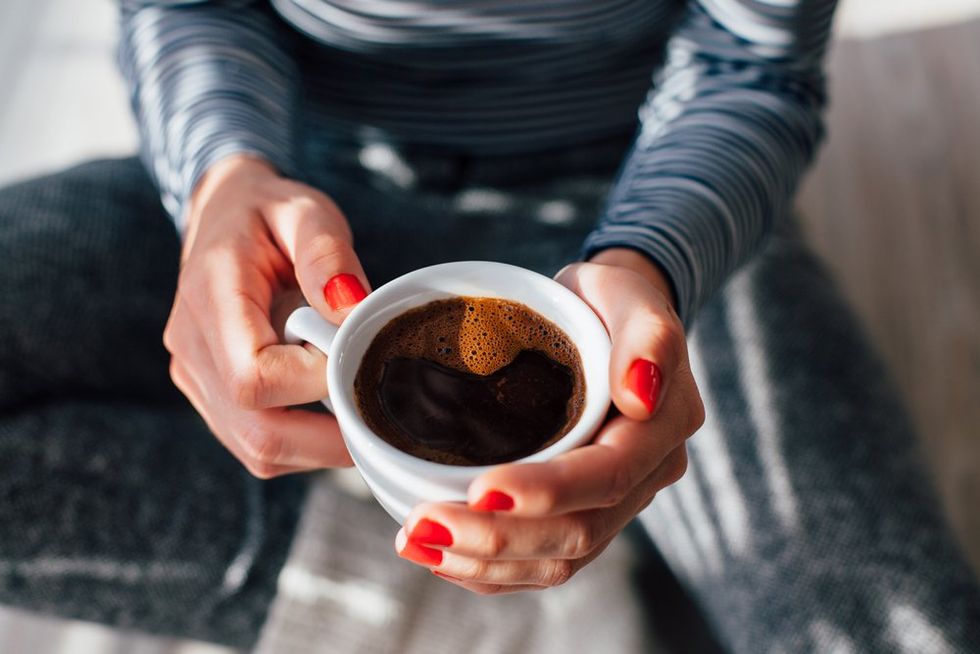
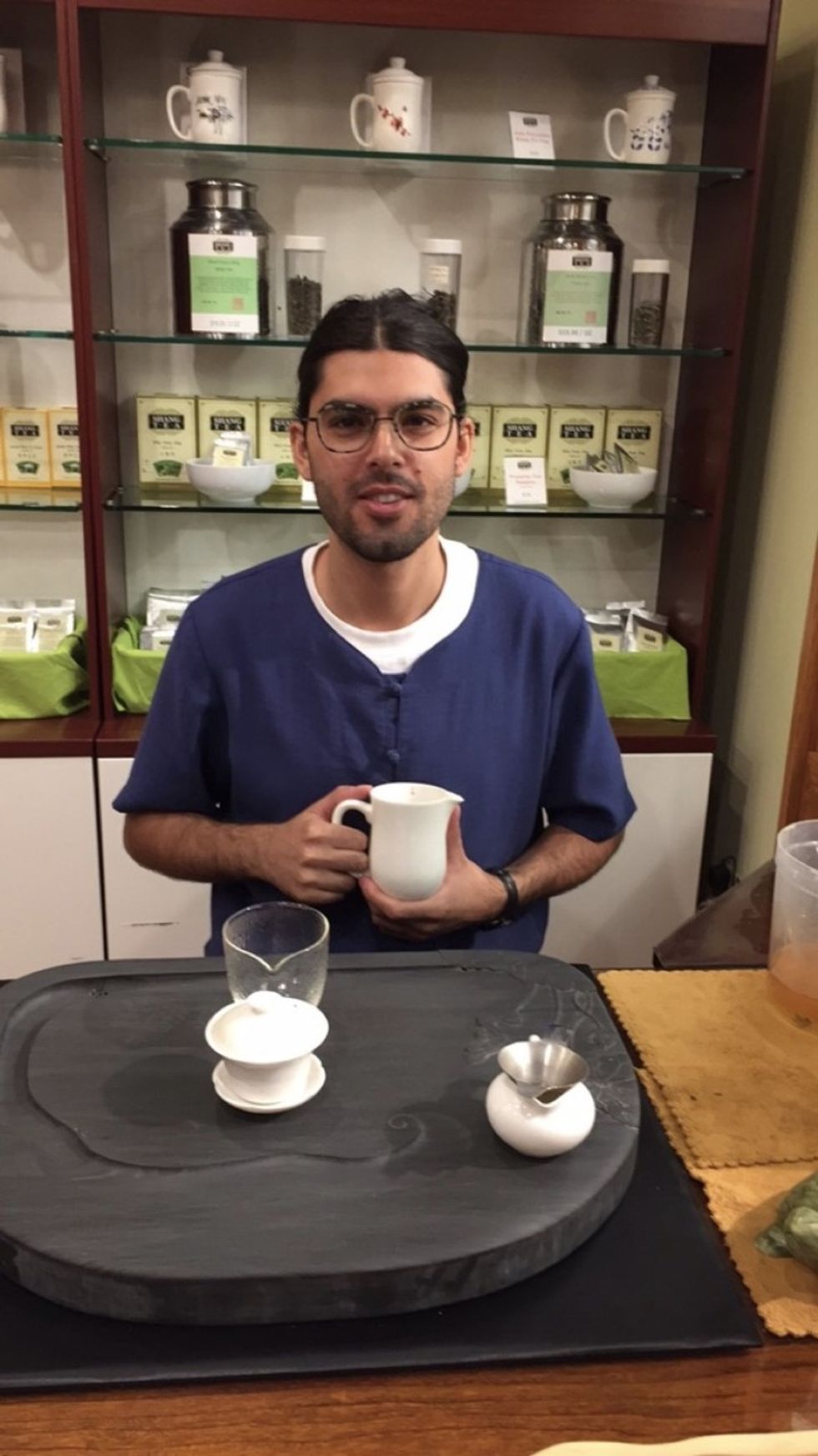 Salar Rajanik, Shang Tea.
Salar Rajanik, Shang Tea.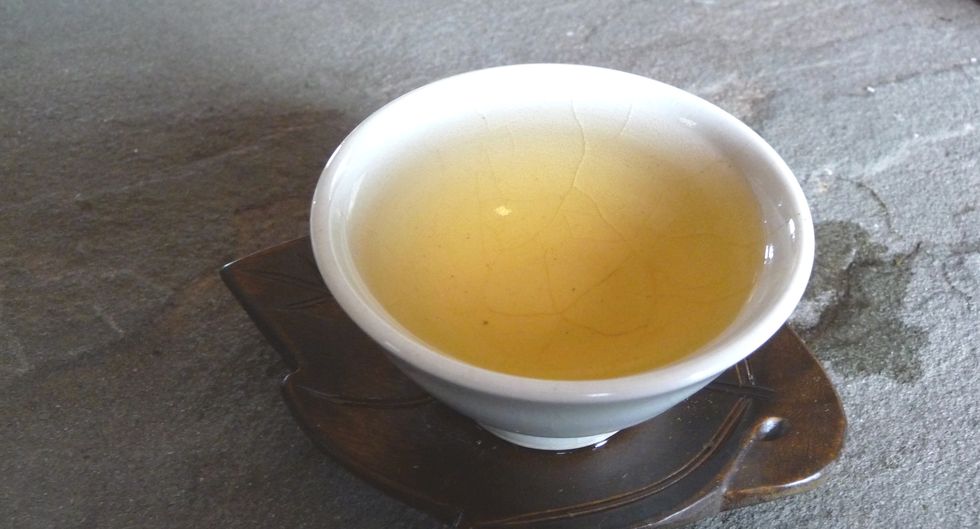
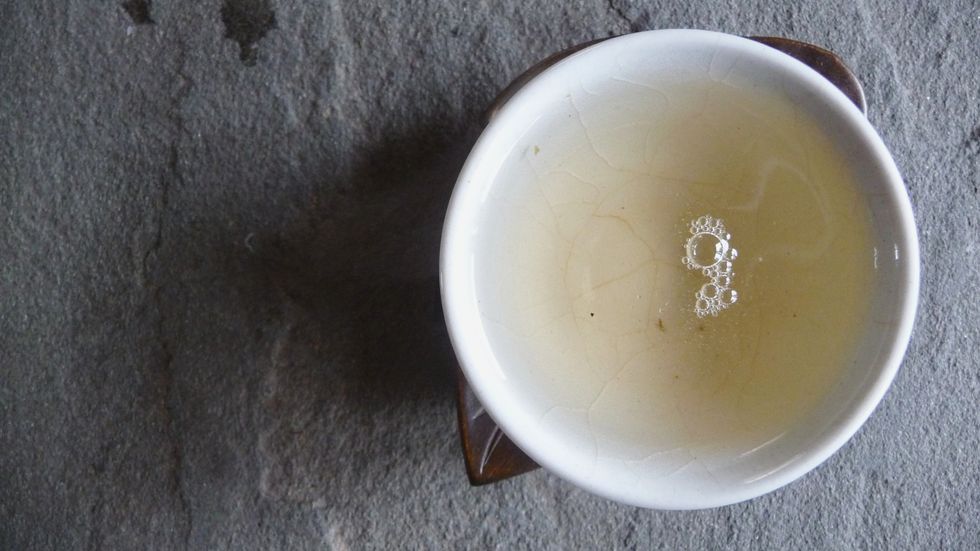
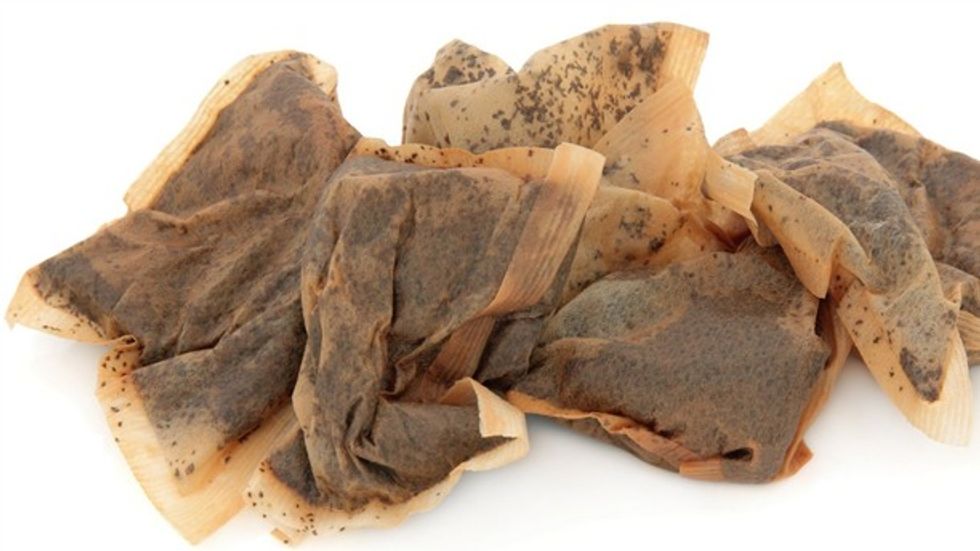
 Zehua Shang, Shang Tea. Photograph courtesy of Shang.
Zehua Shang, Shang Tea. Photograph courtesy of Shang.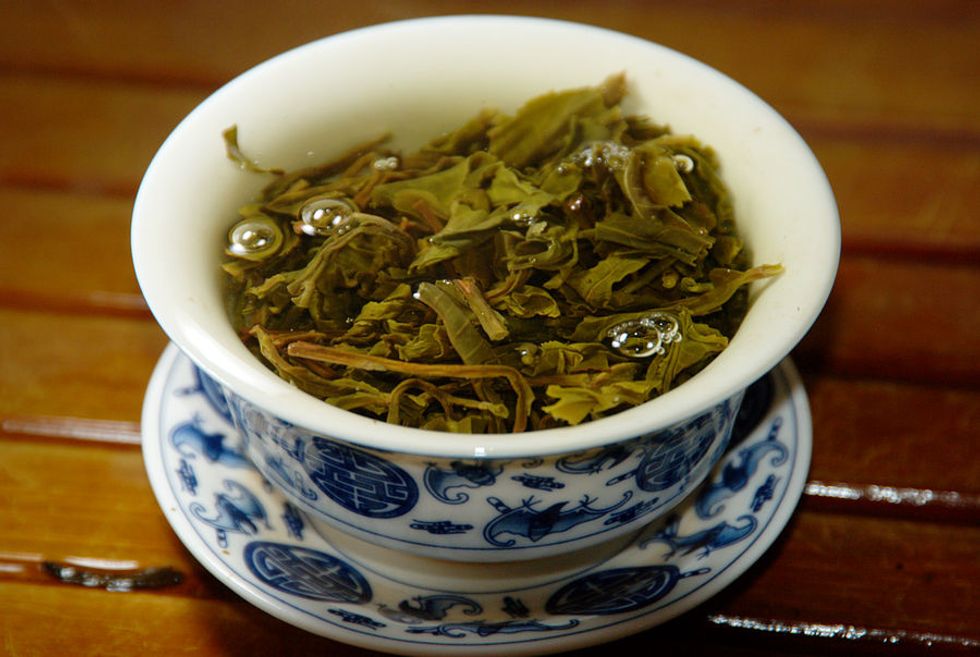
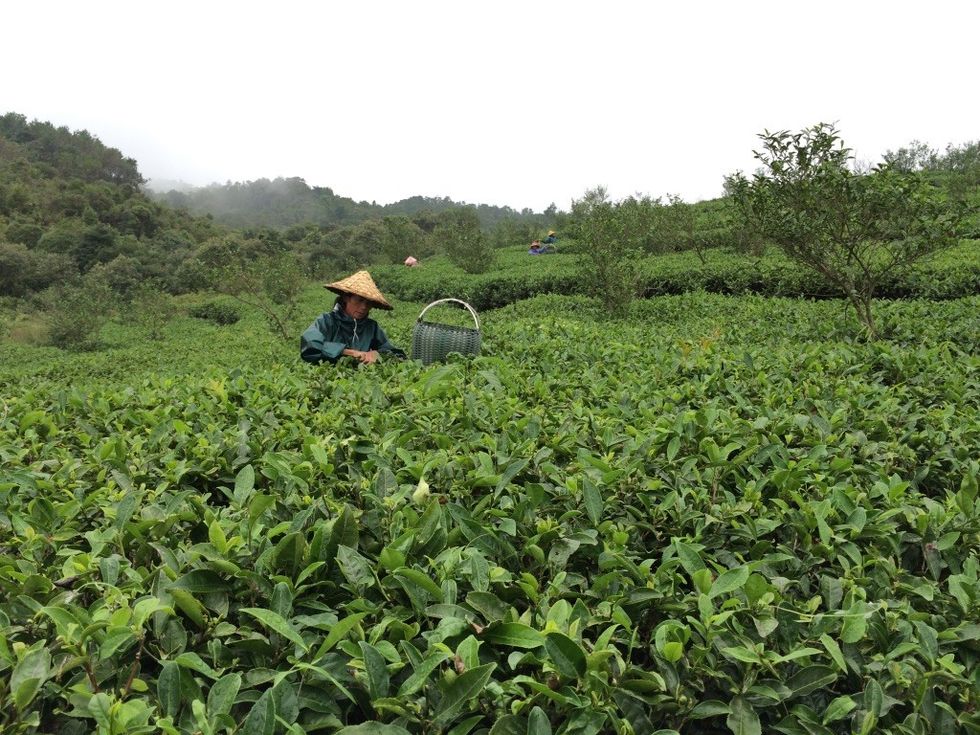 Photographs courtesy of Shang.
Photographs courtesy of Shang.